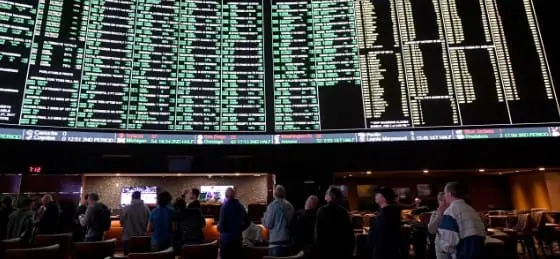One man presses a few keys on his computer keyboard and then steps into a Nevada-licensed sportsbook to place a $5,000 wager on a football match. The house’s numbers cruncher reacts quickly and furiously to the move. He calls the sister properties of the casino or consults his bosses and adjusts the lines for the team that was just bet.
Another man or woman walks up to the same sportsbook window and bets a staggering $50,000 on a football match. Although the house bookmaker takes note of the wager, he does not get up from his morning paper to read. This time, there are no adjustments to the betting lines.
What is the matter?
Sportsbooks are more at risk from the actions of intelligent players and gambling syndicates than they are for the most part. According to bookmakers, the amount of money placed is often less significant than the identity of the person placing the wager. A hotel guest may walk into the sportsbook with a cocktail in his hand, a stack of chips in his other, and an opinion he believes to be valid. This is usually not considered a threat to the house’s bottom lines. Online, even a player who is not well-known for his gambling acumen, can place a large wager without raising an eyebrow.
A sportsbook must distinguish professional from recreational bettors (squares) to find the correct number to attract equal or equal activity to each game side. Bettors are always looking to be ahead of the action. Sportsbooks can respond as quickly as possible when professional bettors make moves.
First, bookmakers must identify the sharps. Many sophisticated bettors use ‘runners’ and ‘beards to place their wagers. These bettors, who are trying to establish their chances at the most appealing betting lines, use many tricks and fraud. They are often able to strike with military precision at multiple sportsbooks simultaneously.
Bookmakers are trained to spot tip-offs like cell phones or clipboards and eventually get to know the runners. The cat-and-mouse game starts again. Online, intelligent professionals open multiple accounts at several reputable sportsbooks to spread their betting action across the lines. This is to hide their true intentions.
Apart from the quality of their play and other aspects,’ sharps are different than squares. The most apparent distinction is that sharps are professionals who make their living from playing, while courts have real jobs.
Sportsbook managers generally say that sharps are low-key, gracious, unassuming players, while those who boast about their success are usually squares with very little chance of winning.
The number of games they wager on and the consistency with which they place their bets on each game are two other distinguishing characteristics of sharps. The average ‘sharp’ football weekend saw them wager about half a dozen different games. The squares only bet one or two games, or worse, almost the entire card.
A professional sports bettor, who requested anonymity, stated, “if you believe you have an advantage, you don’t want to bet on just one or two games.”If you only play a few games, luck becomes too overwhelming.”It’s not a good idea to find yourself in a situation where you are beaten by a referee or have a bad bounce. You can overcome a bad beat if you have played only a few games, perhaps five or six.
The size of the bets placed by “sharps” is also very similar. The player said they almost always bet the same on every game. I don’t have the best bet, a game of the week, or other similar information. If I knew which bets I was winning, wouldn’t that be enough to place those bets? All my chances will prevail; that’s why they are mine.
The sharp player’ never measures success in the short term. He never needs to “get out” on an unorthodox parlay or chase the weekend’s last game. Poker players love to say that one session does not mean anything.”Sharps” understand this.
Parlay betting has the advantage that winnings can be increased. If you see the betting lines move, it is likely because of the “who,” not the “how much.” let’s take the example of four sixes being thrown at the dice table in a row. You could win each time if you placed a 6 dollar bet on the six. This would result in a profit of $7, or $28.The profit would have been much higher if you had increased your stake by six times. A roll of six would have brought in a dollar profit, and your total bet would have been $12.This bet will net you $2 profit, and your new wager will be $24.Your next winning bet will earn you a $4 profit, and your unique chance will go up to $48.This bet will net you a net profit of $56 +$48 +$7 – your original $6 bet. This results in a net profit of $105.This is the benefit of parlay betting.
Your net loss would be $3 if your bet were lost after the second six were rolled. You would make a net loss of $3 if your chance were lost after the third six was rolled. You can also play the same scenario by increasing your bet by only six dollars per roll and keeping the rest. You are guaranteed a profit after the second roll.
You can play parlays in virtually any type of gambling game. There are many variations, and it all depends on your level of aggression. You can make much more than flat bets if your luck is good. Your chances of prevailing are much higher if you combine this parlay play with a game that pays for odds.
Many players make huge scores at casinos by placing parlays on come bets. The potential gain of a two-dollar starting bet on a twenty-pass roll can be staggering.
Parlay betting is based on the rule of playing the rush. If you’re winning, increase your stakes. This is how expert gamblers make huge profits at casinos. The average player does the opposite, lowering their bet rather than increasing it. They want to keep the money they just won. This is a mind trap that winning players need to avoid.


